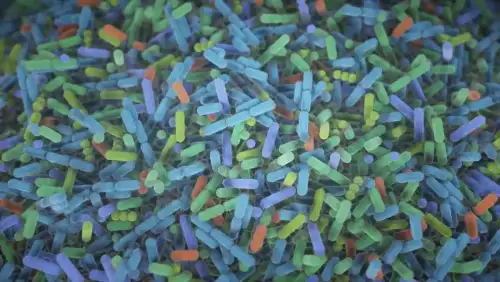Celiac.com 11/20/2025 - More and more people without known health problems are choosing to eat less gluten or go gluten-free, hoping to improve digestion, feel lighter, or boost their well-being. But scientists still lack strong evidence about how that change affects the gut microbes in people who do not have celiac disease or gluten sensitivity. Because the microbes in our intestines play key roles in digestion, immune balance, and overall health, any shift in their balance could have consequences. This study was designed to see what happens when healthy adults switch from a normal gluten-containing diet to one with reduced gluten over an extended time.
How the Study Was Designed
The study recruited forty healthy men and women between ages about 20 to 50. All participants were eating a typical diet containing gluten (mostly from bread, pasta, etc.). Over the course of the experiment, the volunteers replaced wheat-based foods (bread, pasta) with rice and maize (corn) flour equivalents to reduce gluten intake by about fifteen grams per day. The intervention lasted in two stages: first eight weeks on the low-gluten diet, and then another eight weeks for a subset of participants, making a total of sixteen weeks of reduced gluten for that subset.
Celiac.com Sponsor (A12):
At the start (baseline), after eight weeks, and after sixteen weeks (for those continuing), stool samples were collected. The researchers analyzed which types of bacteria were present (via gene sequencing), how many of each, and measured metabolic byproducts the microbes were producing (using chemical methods). They also used more direct molecular quantification and cultured some bacteria to validate patterns.
What Changed in the Gut Microbiota
One of the first observations was that the overall “richness” of the microbial community—how many different species were present—declined over time on the low-gluten diet. After sixteen weeks, the drop in richness was more pronounced than after just eight weeks. This suggests that longer exposure to the low-gluten diet drove a deeper shift in microbial diversity.
Importantly, several bacteria considered beneficial to gut health decreased in abundance. Two key groups that fell were “Akkermansia muciniphila” and “Bifidobacterium” species. These bacteria are often associated with good gut barrier integrity, anti-inflammatory effects, and metabolic health. The study also saw reductions in bacterial species that break down certain plant fibers and cell wall polysaccharides. Because switching away from wheat affected not only gluten but also the fiber types and associated compounds that microbes feed on, some of these microbial shifts likely reflect the change in fiber sources.
Changes in Microbial Metabolism
Even though the main short chain fatty acids (which many beneficial gut bacteria produce) did not show large shifts overall, a notable change was seen in one of the “intermediate metabolites”—ethanol. The concentration of ethanol in fecal samples increased during the low-gluten diet phases. Ethanol is not typically considered a “friendly” metabolite in the gut, and elevated levels could indicate altered fermentation pathways or stress in the microbial community.
The authors suggest that because many of the fiber types (prebiotics) and compounds that feed beneficial bacteria were reduced in the diet replacement, microbes had less of their favored food sources. As a result, the gut ecosystem might shift into less optimal modes of fermentation, producing byproducts like ethanol that may have negative downstream effects.
Interpreting the Findings: What It May Mean
These results suggest that, in healthy people, a sustained low-gluten diet can shift the gut microbiota toward a less balanced or “dysbiotic” state. The decrease in beneficial microbes like Bifidobacterium and Akkermansia is concerning, given their known roles in maintaining gut barrier integrity, regulating inflammation, and supporting metabolic balance.
Because the dietary change involved swapping wheat (with its associated fibers and compounds) for rice and maize, the microbial shifts are likely a combination of reduced gluten and altered fiber composition. In other words, the gut microbes are responding not just to less gluten, but to the different “food” the microbes get when wheat is removed. Over time, these changes may reduce microbial diversity, weaken beneficial bacterial populations, and push microbial metabolism toward less desirable byproducts.
Limitations and Questions Remaining
It is important to note that the study involved healthy people without celiac disease or known gut conditions. The effects in people who already have celiac disease or gluten sensitivity could differ. Also, the study lasted sixteen weeks at most; longer follow-up would help show whether the microbial community can stabilize or recover. The study cannot prove that these microbial changes cause negative health outcomes, only that they are associated with the low-gluten diet in this sample. Individual variability is also a factor: not everyone’s microbiota reacts the same way.
Why This Might Be Meaningful for People with Celiac Disease
Although this study looked at healthy people, it holds lessons for those with celiac disease. While celiac patients must avoid gluten for medical reasons, this research underscores how changes in diet (beyond just gluten removal) affect gut microbes. Maintaining or restoring a healthy microbiota may require paying attention to fiber diversity, prebiotic foods, and microbial support (e.g. probiotics or fermented foods).
For people with celiac disease, this study hints that the gut ecosystem is delicate. After years of gluten-driven damage and repair, the microbial community may already be vulnerable. A gluten-free diet is central, but optimizing gut microbiome health might require extra steps to preserve beneficial bacterial populations. Understanding how diet affects gut microbes could help design dietary strategies or supplements that support better recovery, symptom relief, and long-term gut resilience in celiac disease.
Read more at: mdpi.com












Recommended Comments
Create an account or sign in to comment
You need to be a member in order to leave a comment
Create an account
Sign up for a new account in our community. It's easy!
Register a new accountSign in
Already have an account? Sign in here.
Sign In Now